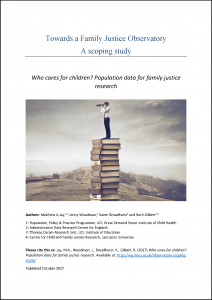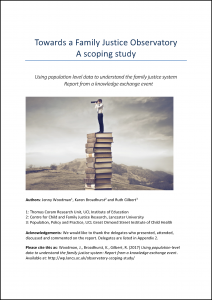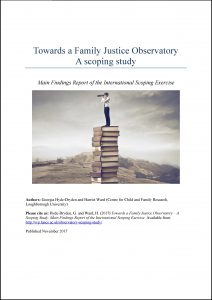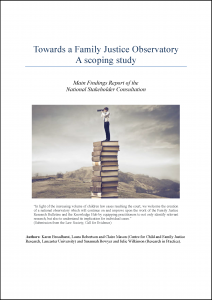November, 2017: Main Findings Report of the International Scoping Exercise
This report describes the findings of an exercise to gather evidence from international stakeholders based on an international call for evidence and telephone interviews with leaders in the field. Building on findings from the national consultation, this report provides examples of how research evidence is currently being used in several countries, the challenges encountered, and examples of innovative and good practice.
Cite as
Hyde-Dryden, G. and Ward, H. (2017) Towards a Family Justice Observatory – A Scoping Study: Main Findings Report of the International Scoping Exercise. Available from: http://wp.lancs.ac.uk/observatory-scoping-study/
October, 2017: Who cares for children? Population data for family justice research
 This report describes the population data sources available for England that concern state-authorised decisions about who cares for children and how these data could be used to improve the effectiveness and safety of decision-making and quality of services. The report outlines what is required for the effective use of family justice data and proposes a series of recommendations for data providers, research funders, researchers and the Family Justice Observatory.
This report describes the population data sources available for England that concern state-authorised decisions about who cares for children and how these data could be used to improve the effectiveness and safety of decision-making and quality of services. The report outlines what is required for the effective use of family justice data and proposes a series of recommendations for data providers, research funders, researchers and the Family Justice Observatory.
Cite as
Jay, M.A., Woodman, J., Broadhurst, K., Gilbert, R. (2017) Who cares for children? Population data for family justice research. Available from: http://wp.lancs.ac.uk/observatory-scoping-study/
August, 2017: Main Findings Report of the National Stakeholder Consultation
Cite as
June, 2017: Using Population Level Data to Understand the Family Justice System – Report from a Knowledge Exchange Event
 This report encapsulates key messages arising from an all-day event, held on Monday 30th January at the Farr Institute of Health Informatics Research, London. This event focused on the potential for existing population-level data (administrative data, cohort studies and large scale longitudinal surveys) to be used to produce a research evidence base to support services for children and families who come into contact with the family courts. Population-level data is a powerful source of evidence but also presents analytic, governance and ethical challenges. At the event members of the research community, including representatives from data providers, discussed opportunities and challenges within existing population-level data, ways forward when trying to increase the amount of good quality population-level research in the field and how an observatory might support these endeavors.
This report encapsulates key messages arising from an all-day event, held on Monday 30th January at the Farr Institute of Health Informatics Research, London. This event focused on the potential for existing population-level data (administrative data, cohort studies and large scale longitudinal surveys) to be used to produce a research evidence base to support services for children and families who come into contact with the family courts. Population-level data is a powerful source of evidence but also presents analytic, governance and ethical challenges. At the event members of the research community, including representatives from data providers, discussed opportunities and challenges within existing population-level data, ways forward when trying to increase the amount of good quality population-level research in the field and how an observatory might support these endeavors.
